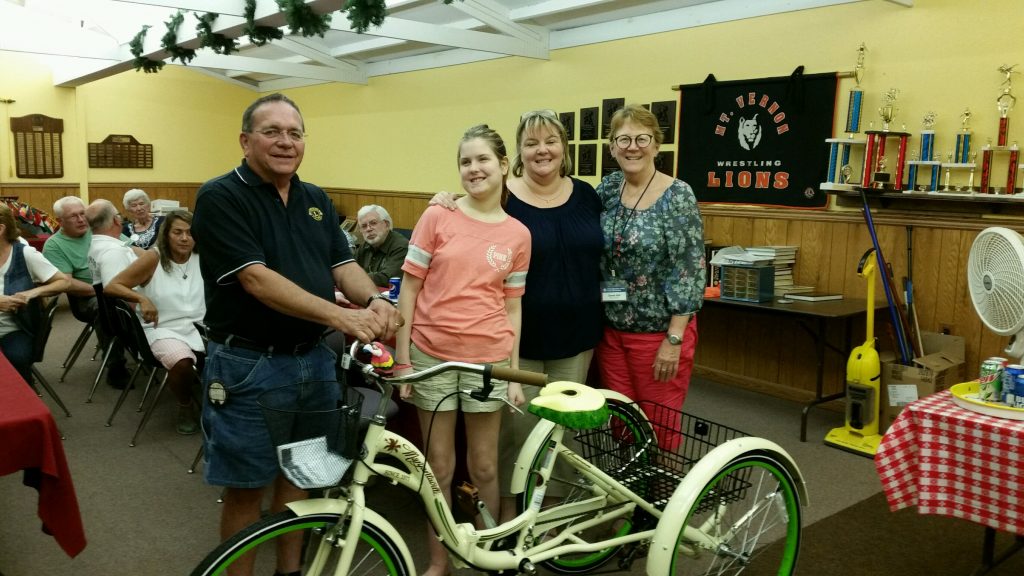DSCC Teen Surprised with Special “Beach Bike”
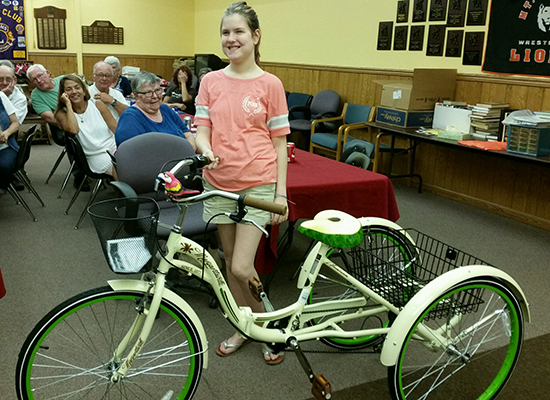
DSCC Care Coordinator partnered with Mount Vernon Lion’s Club to make the gift a reality.
Fifteen-year-old Allie Riley of Mount Vernon wanted a bicycle of her own so she could go on rides with her family and friends. A traditional bicycle, however, was not a safe option for Allie as she is visually impaired and has problems with her depth perception.
Allie’s mother, Melinda, did some research and found some tricycle options for Allie but couldn’t afford the price tag. Melinda went to the family’s Care Coordinator, Donis Vail, from the University of Illinois at Chicago’s Division of Specialized Care for Children (DSCC) for help.
Allie has been enrolled with DSCC since she was an infant. Donis, who works in DSCC’s Olney Regional Office, used her community connections to find funding for the tricycle and pull off a sweet surprise for Allie.
Knowing that Allie is a big fan of musician Jimmy Buffett, Donis found a Buffett-themed adult tricycle that’s cream with green tires, a green seat and a parrot-shaped bike horn. She then started researching funding options. When she reached out to the Mount Vernon Lions Club, they offered to pay the entire cost of the tricycle.
Donis and the Lions Club then invited Allie and Melinda to the club’s meeting last month to surprise her with the tricycle. Melinda told Allie that they were going to a bank meeting so she wouldn’t suspect.
When Allie arrived and saw her new tricycle, she was “over the moon,” Melinda reports. Allie also immediately stipulated that her new wheels are not merely a tricycle but a “beach bike.”
Our Care Coordinators are pros at identifying a family’s needs and working with local community organizations to connect the family and youth with the services and resources that can help. The Mount Vernon Lions Club’s generous donation is a wonderful example of these connections and how much they benefit our participants.
A huge thank you to all involved, and happy riding, Allie!
DSCC Family Donates Wagons of Hope
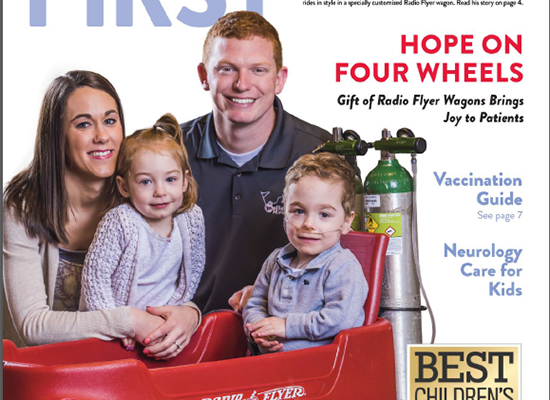
The Ruder family designed and donated special “rocket pack” Radio Flyer wagons for children who depend on medical equipment.
Kara and Logan Ruder understand how difficult it can be to care for and transport a technology-dependent child.
Their 3-year-old twins, Beau and Brooklyn, were born 12 weeks premature. While Brooklyn grew to be healthy, Beau was diagnosed with chronic lung disease and a combination of four heart defects called tetralogy of Fallot.
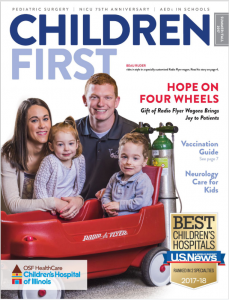
The Ruder family and the story of their specially designed wagon were featured in a recent issue of Children First, a publication of OSF HealthCare Children’s Hospital of Illinois.
Beau spent seven months total in intensive care at OSF HealthCare Children’s Hospital of Illinois. During that time, he became enrolled with the University of Illinois at Chicago’s Division of Specialized Care for Children (DSCC), which has helped the Ruders understand and maximize Beau’s insurance coverage and connected them to service providers, such as nursing agencies and durable medical equipment suppliers.
Once Beau arrived home, Logan jokes that his son “brought half the hospital” with him. Since he requires round-the-clock oxygen through a nasal cannula, Beau needs an oxygen tank as well as a monitor, suction machine, medicine pump and feeding pump for his gastronomy tube
It was overwhelming for the family to try to leave the house, especially when Kara would have to take both kids to Beau’s many medical appointments. A stroller just couldn’t comfortably hold all of the equipment and keep it accessible for when Beau needed it.
The inspiration for a better way struck after the twins received a Radio Flyer wagon for their first birthday. Logan developed a special attachment for the wagon to hold Beau’s oxygen tank and still give him plenty of room. The Ruders describe how the design came about in a touching video for OSF HealthCare Children’s Hospital of Illinois.
The wagon’s “rocket pack” was such a hit with Beau and others who saw it, the Ruder family decided to make additional wagons to donate to Children’s Hospital of Illinois. You can read more about the family’s story and their donation in the hospital’s Children First publication.
“When you’re a dad like me who’s not overly medical, there’s not much you can do for a kid like (Beau) who’s so sick,” Logan said. “To have something like this (wagon) that I can do for him, it makes me feel good.”
He would love to create more wagons for children who could benefit from one and encourages interested families to call him at (309) 360-3410.
Logan said he hopes the wagons can give children in similar situations a feeling of normalcy.
“When you pull a kid through the hospital in a wagon, it helps them feel like a kid,” he said.
We’re proud of the Ruder family’s kind hearts and desire to help other children with complex medical needs. They truly are an inspiration!
DSCC Youth is Champion for Animals in Need
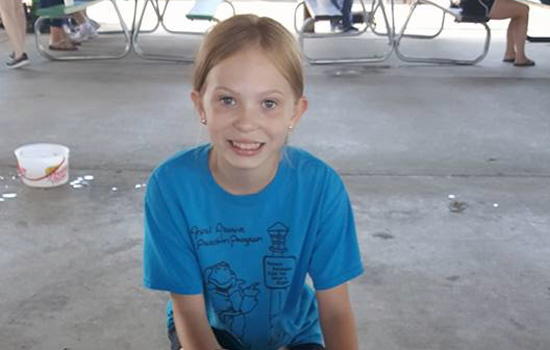
Emma Wiker organized her third successful dog walk to benefit abused and neglected animals.
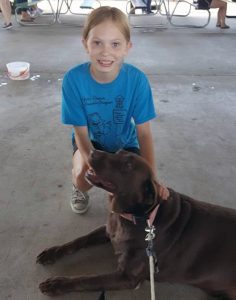 For many preteens, summer is a time to relax, have fun with friends and enjoy the break from homework before school starts again. But for 12-year-old Emma Wiker, summer is the time to focus on her passion for helping animals in need and inspiring others in her community to do the same.
For many preteens, summer is a time to relax, have fun with friends and enjoy the break from homework before school starts again. But for 12-year-old Emma Wiker, summer is the time to focus on her passion for helping animals in need and inspiring others in her community to do the same.
Three years ago, Emma started the Animal Abusive Protection Program to raise money for abused or abandoned animals in Menard County. She sells buttons and key chains and organizes a hugely popular annual dog walk in her in her hometown of Athens to benefit the program.
Emma also has a vocal cord dysfunction that impairs her ability to breath. She was wrongly diagnosed as asthmatic for most of her life and spent years suffering allergic reactions to unnecessary medications until 2016. She then became enrolled in the University of Illinois at Chicago’s Division of Specialized Care for Children (DSCC) program, which has helped her family communicate with Emma’s doctors and specialists and find medical providers that are covered by their insurance. Her mother, Violet, is a former Care Coordinator and now DSCC’s Family Liaison.
Violet says Emma has always been determined and committed to helping others. She was inspired to start the dog walk after seeing a disturbing image of an abused dog that went viral on social media.
Though she hasn’t reached her teen years yet, Emma handles all of the responsibilities of planning and coordinating the dog walk herself and has become a local celebrity.
About 100 people attended this year’s third annual dog walk on July 15, raising more than $3,000 for Menard County Animal Control. (You can watch local news coverage of the event here.)Ten current and former DSCC staffers attended the dog walk with their pets to support Emma’s cause.
“This is another perfect example of how DSCC staff go above and beyond to support each other,” Violet said.
Emma is already looking forward to planning next year’s dog walk. You can read more about Emma’s efforts and how she got started with the Animal Abusive Protection Program here.
Amazing job, Emma!

DSCC staff and their pets attend Emma Wiker’s third annual dog walk in Athens to benefit Menard County Animal Control.
In the News: DSCC Teen with CF Leads by Example

“He is a modest, humble kid who always puts forth his best effort and rarely complains.”
Alex Killian is an involved eighth-grader at Gibson City Middle School who pours himself into his studies and extracurricular activities with passion and focus. But he’s not your typical middle school student. His teachers say they’re the ones who look up to him for his bravery and determination as he lives with cystic fibrosis (CF).
Alex was recently featured in WCIA 3 News “Kid to Know” series after his teachers recommended him for the honor.
He is a straight-A student who loves math, science and history. He enjoys playing in the local soccer league and has been an active member of the GCMS Scholastic Bowl team for the past three years. Alex went to state for the geography bee and won every single competition in that event for two years in a row. He also participates in summer and winter theater productions from a local theater group called A.C.T. and tried his hand at track and field this spring.
“He is a modest, humble kid who always puts forth his best effort and rarely complains,” his mother, Andrea Killian, said.
Therefore, many are surprised to learn that Alex was born with CF, a disorder in which a defective gene causes thick mucus to buildup in the lungs, pancreas and other organs. This buildup causes persistent lung infections and restricts breathing as the disease progresses.
Alex was diagnosed with CF in December 2003 and the counselor at the family’s CF Clinic in Peoria suggested the Killians consider enrolling with the University of Illinois at Chicago’s Division of Specialized Care for Children (DSCC).
“We’ve been working with DSCC ever since and have had a very positive experience. We have typically qualified for copay assistance and over the years, that has been a huge help with prescriptions as Alex takes several medications and even the copays become rather costly,” Andrea said.
The Killians recently began working with their second DSCC Care Coordinator, Angel, and say she’s been a huge help in addressing Alex and his family’s needs.
In 2015, Alex was selected for the Make-A-Wish Program and chose to travel to Ireland with his whole family. The family made the trip over spring break 2016. That May, he was hospitalized for the first time and received a peripherally inserted central catheter (PICC) line. He was able to finish the school year with a 20-day round of IV antibiotics at home.
“He was so disappointed to miss the last few weeks of school, but again, he took the changes in stride, completed all his homework and made it to school for the last couple of days with his IV in place,” Andrea said.
This past winter, Alex was asked to speak about his experiences with CF at his school’s “GRIT” assembly, which features students speaking about challenges they face in their daily lives.
Andrea says Alex takes an active role in his CF care by helping to clean and disinfect his nebulizer cups and by doing his treatments and taking his medications on his own. Currently, he does chest therapy via a vest that shakes him twice a day for 30-minute periods. He also does a minimum of four nebulizer treatments per day and takes several medications in pill form.
In addition to excelling at school and his extracurricular activities, Alex is also a great big brother to three younger siblings and is a huge help to his parents at home, Andrea said.
Congratulations on all of your achievements, Alex! We’re excited to see what you accomplish next.
DSCC Teen’s Princess Dream Comes True
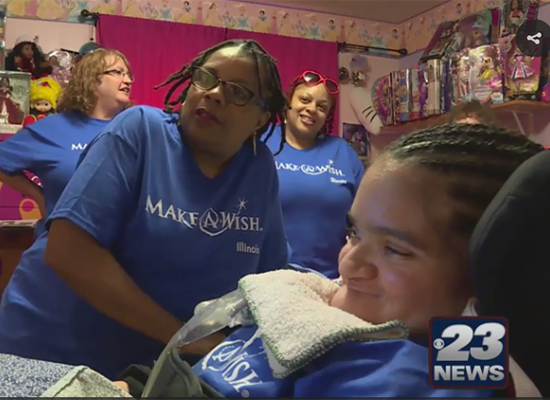
News story captures Trinity’s special send-off to Disney World.
Trinity Alston always wanted to be a princess. Thanks to Make-A-Wish, she and her family recently traveled to “The Most Magical Place on Earth” to make her dream come true.
Trinity, 15, has a structural defect in her brain called Chiari malformation, which causes brain tissue to extend into her spinal canal. She is quadriplegic and non-verbal and uses a computer to speak with her family and caretakers.
Rockford’s 23 WIFR news station covered the community’s special send-off for Trinity, including a motorcycle escort, before she and her relatives boarded a plane to Disney World in April.
For nearly 10 years, Trinity and her family have received support through the Home Care Program, operated by the University of Illinois at Chicago’s Division of Specialized Care for Children on behalf of the Illinois Department of Healthcare and Family Services.
We are thrilled to see Trinity receive the royal treatment she deserves!
Summer Camp Opportunities

A variety of camping experiences are available across the state for children of all needs and abilities.
Summer is just around the corner and the search begins for fun and educational activities to keep children’s minds and bodies engaged during the break from school.
Our Care Coordinators and support staff have helped compile a list of day and overnight summer camp opportunities across the state that are designed for a variety of special needs and abilities, including many of our program’s eligible medical conditions.
The list of 2017 summer camp activities is available here.
You may also search for events in your area by clicking on a regional office near you.
Illinois Sound Beginnings Website Wins National Award
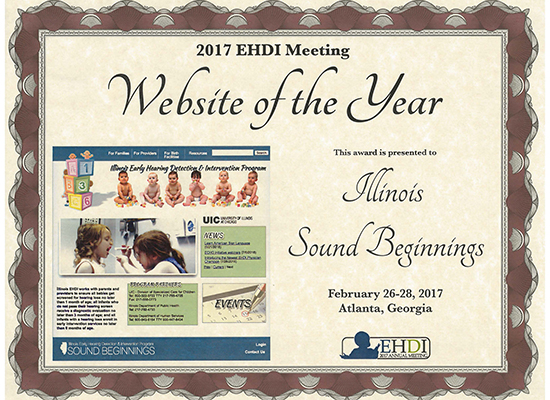
Illinois Sound Beginnings is the online destination for the Illinois Early Hearing Detection and Intervention (EHDI) Program.
Illinois EHDI works with parents and providers to ensure all babies are screened for hearing loss no later than 1 month of age; all infants who do not pass their hearing test receive a diagnostic evaluation no later than 3 months of age; and all infants with a hearing loss enroll in early intervention services no later than 6 months of age. The program partners with the University of Illinois at Chicago’s Division of Specialized Care for Children, the Illinois Department of Public Health and the Illinois Department of Human Services.
The program’s website at http://www.illinoissoundbeginnings.org/received the Website of the Year award during the 2017 EHDI Annual Meeting on Feb. 26-28 in Atlanta, Georgia.
The site includes resources for families and professionals, including information about diagnostic testing, screenings, hearing aids and cochlear implant options, and parent support.
Congratulations, Illinois EHDI!
DSCC Toddler Becomes Internet Sensation
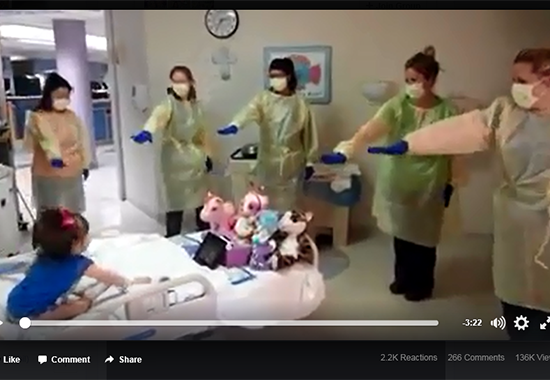
Video of Madison Austin’s Hokey Pokey party with her PICU nurses goes viral.
A little fun can go a long way to brighten the day of a seriously ill child.
Four-year-old Madison Austin’s pure delight to host a special Hokey Pokey Party with her nurses at HSHS St. John’s Children’s Hospital has taken the internet by storm and melted countless hearts worldwide.
Madison was born with a rare birth defect called Neuronal Migration Disorder, which has caused low muscle tone in her body and narrowed airways in her lungs. She and her family receive support through the Home Care Program, operated by the University of Illinois at Chicago’s Division of Specialized Care for Children on behalf of the Illinois Department of Healthcare and Family Services.
Madison has a tracheostomy tube and has required several hospitalizations at St. John’s in her short life. In February, she was admitted to the pediatric intensive care unit with breathing complications from the flu and other illnesses.
To help lift her spirits, Madison’s nurses happily agreed to dance along to her favorite song, the Hokey Pokey. Her mother, Krista, posted a video of the dance party to her Facebook page. It soon went viral and has since appeared on numerous media outlets, including local newscasts across the country, the Today Show and ellenNation.
The Hokey Pokey party became a daily occurrence for Madison and her nurses, and the Austin family expects to continue the dancing at home.
We hope Madison’s star continues to shine brightly and spread joy to others!
DSCC Teen Recovering Well After Heart Transplant

“He has a very bright future in front of him.”
At only 14 years old, Nathan “Nate” Wells is no stranger to major surgery.
The teen was born with hypoplastic left heart syndrome, a congenital heart defect in which the left side of his heart failed to form correctly and could not properly pump oxygen-rich blood through his body.
The condition made breathing and strenuous activity difficult for Nate, and he required multiple surgeries to help improve his heart’s blood flow.
On Nov. 9, Nate underwent his seventh open-chest surgery. This time, he received a new heart.
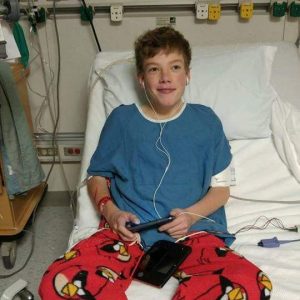 “He’s only lived with two chambers (of the heart) pumping, instead of four like you and I have,” his mother, Karen, said. “If we didn’t do this transplant, there would be issues with his other organs.”
“He’s only lived with two chambers (of the heart) pumping, instead of four like you and I have,” his mother, Karen, said. “If we didn’t do this transplant, there would be issues with his other organs.”
The transplant was ultimately a success and Nate now continues to recover and receive plenty of support from the Villa Grove community, as detailed in a WCIA 3 News story.
“We’ve had a very good support system,” Karen said. “That’s what’s pulled us through the most.”
Nate enrolled in the University of Illinois at Chicago’s Division of Specialized Care for Children (DSCC) program in 2009 after a procedure to repair one of his heart valves failed.
“He had a stroke and seizures at that point, so we knew we’d need additional care that was more than what we had had in the past,” Karen said. “He would need physical and occupational therapy and additional medications than what we were used to, and he would require at-home oxygen.”
A hospital social worker encouraged the family to contact DSCC, and Karen says they are grateful they did.
“(DSCC) has been great over the last seven years. It’s wonderful what (the program has) been able to help with,” Karen said, noting DSCC staff’s medical expertise and willingness to assist with any questions or concerns the family has.
This support was crucial as Nate and his family fought to keep him healthy.
The stress of his heart pumping with only two chambers began to take its toll in recent years, and the family was able to meet with a heart transplant team last summer. After an extensive evaluation, Nate was approved for the transplant and received the call on Nov. 8 to travel to St. Louis for surgery the next morning.
The procedure was the toughest that Nate has been through and there were some frightening complications immediately after the surgery. But Karen said their family had strong faith and after five weeks in the hospital, Nate arrived home just in time for Christmas.
“Knowing how he is such a fighter, we knew he’d be able to use this heart to the fullest extent,” Karen said. “We hadn’t fought for 14 years to keep him here just so he couldn’t keep this new heart.”
So far, Nate’s body has accepted the new heart well and he’s shown great progress during the cardiac rehabilitation program he’s started three times a week. He’s also anxious to start school once flu season is over.
“If he takes care of himself, takes his medication, exercises and eats right, this heart should last him 20 years or more,” Karen said. “For everything that he has been through, he’s a very bright young child with a lot of potential, if he applies himself. He has a very bright future in front of him.”
New Family Liaison Joins DSCC Team
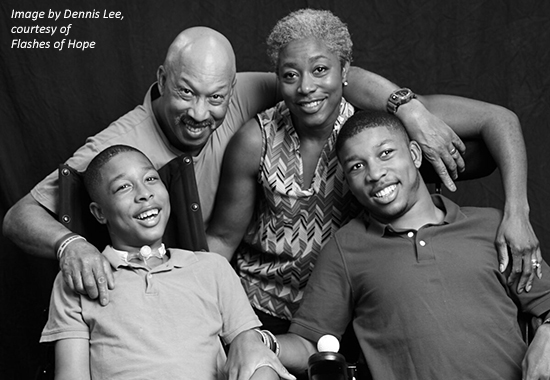
DSCC parent Gina Jones will work with families north of Interstate 80.
The University of Illinois at Chicago’s Division of Specialized Care for Children (DSCC) is proud to welcome a new part-time Family Liaison to the team. Gina Jones, a Chicago registered nurse and mother of two sons in the DSCC program, will help build relationships with families and explain their needs to DSCC administration and staff.
She joins Springfield-based Violet Wiker, who became DSCC’s full-time Family Liaison in December. Gina will work out of the Chicago Administrative Office and be responsible for meeting with families and community members in the Chicago, Lombard, Mokena and Rockford areas. She will also help Violet reinvigorate the Family Advisory Council.
Gina has extensive experience with DSCC and representing families of children with special healthcare needs through her sons, Garrett, 19, and Gavin, 15. The young men were born with a rare genetic neurodevelopmental disorder called Pelizaeus-Merzbacher Disease that affects their vision and ability to eat, speak, breathe and move. The family first learned of DSCC when Gavin was only 1 year old, and both he and Garrett now receive in-home skilled nursing through the program. (Read more about the Jones family here.)
Gina says she hopes to empower families like hers.
“I want to help families see the possibilities in disabilities,” Gina said. “Health care is a part of our life, but we can still lead an active and fulfilling lifestyle outside of that.”
As a registered nurse, Gina has worked in physical rehabilitation, labor and delivery and hospice. She is also dedicated to raising awareness about neurodevelopmental diseases, disabilities and their effects on families.
She is the family member trainee coordinator for the LEND (Leadership Education in Neurodevelopmental and related Disabilities) program at the University of Illinois at Chicago and is a community advisory board member for the Leadership for Urban Primary Care Education and Transformation (LUCENT) program at the University of Chicago. She has served on the board of trustees for the PMD Foundation and continues to be active in family support and fundraising for that organization. Additionally, Gina is involved with The Family Forum for Region 4 Midwest Genetics Collaborative.
Gina also created and chaired the Jones PMD Walk ‘n Roll, an annual fundraiser for Pelizaeus-Merzbacher Disease, for five years.



